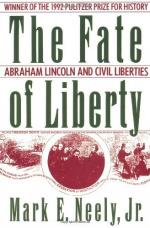|
This section contains 620 words (approx. 2 pages at 400 words per page) |

|
Chapter 10 Summary and Analysis
Chapter 10, "Lincoln and the Constitution," concentrates briefly on the most central character in the Civil War, beginning by claiming Lincoln is no dictator, but a practical man not averse to tyranny. Lincoln is a Whig twice as long as he is a Republican, and as such takes a broad view of what the Constitution allows the federal government to do. His impoverished rural youth makes him impatient with Democratic arguments in the late 1840s that economic improvements cannot be funded. As a congressman in 1848, he advocates expediency, confident the Constitution will somehow be on his side, but opposes President Polk's impractical and time-consuming call for an amendment. Lincoln thinks it best to treat the Constitution as untouchable and to use "express authority" and reasonably broad interpretation as a means of doing as one must.
The turning point in Lincoln's awareness of...
(read more from the Chapter 10 Summary)
|
This section contains 620 words (approx. 2 pages at 400 words per page) |

|




